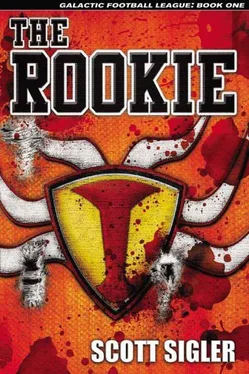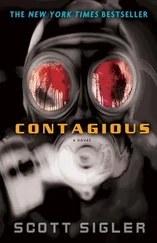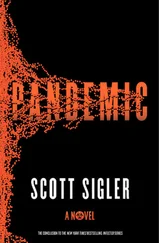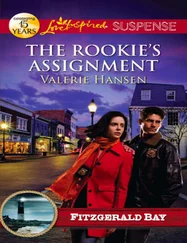[WELCOME TO HUDSON BAY SURFACE STATION,] the computer voice echoed. [WE HOPE YOU ENJOY YOUR STAY.]
Quentin followed along as the passengers disembarked. The ground station looked like an exact copy of the orbital station, with the exception that the walls were clear and offered a breathtaking view of Hudson Bay and the surrounding complex. Waves crashed into clear walls, sending up clouds of droplets that sparkled in the sunlight before misting back down. He’d never seen so much water before, yet the footing was as rock-solid as dry land.
To the east sprawled the Hudson Bay Airport, a flat rectangle two miles across and three miles long. The airport, elevated about a hundred feet above the water level, rested on two-dozen thick black pylons that ran below the surface. Each pylon, he was told, connected to a sub-surface pontoon some three hundred feet below the surface. Dynamic positioning systems controlled the depth and position of each pontoon, ensuring fixed positioning even in the worst storms. He watched a triangular passenger plane land, escorted in by a flight of boxy-looking Creterakian fighters.
To the north sat Quentin’s destiny: Hudson Bay Stadium. Unlike the airport, the bottom levels of the stadium dome actually rested below the water, with the playing field sitting some 150 feet beneath the surface. A compartmentalized triple-walled hull kept the Hudson Bay waters in check, and rumor had it the stadium housed over a thousand water pumps to control leaks ranging from a tiny pin-hole to the kind of gaping wound caused by a terrorist attack.
The massive lower bowl also rested below the surface, the top seats just peeking out above the water line. The second and third decks rested within a gleaming, crystal-clear dome that rose hundreds of feet into the air.
To the south sat the floating wonder of Hudson Bay City. Centuries ago, the city was built to house Human and Whitok workers harvesting untold amounts of oil and natural gas from deep below the surface. The high-tech boom town saw many decades of prosperous growth, until the natural resources started to run out about the same time demand for those resources dropped due to new technologies. City officials then used the platform’s isolation as a trump card to win a contract for the Earth’s second orbital elevator, the first having been built over the English Channel.
With the orbital elevator in place, Hudson Bay City blossomed. As one of two main hubs for interstellar commerce, Hudson Bay’s economy transformed from drilling to shipping. City officials also lured tourist dollars by building the largest football stadium on Earth. The city’s former isolation turned out to be its strongest asset — set in the middle of Hudson Bay, the stadium was easily defended from the airborne terrorist attacks that plagued many other Earth facilities.
Messal the Efficient scurried about, his helpers gathering the Krakens players.
“We are taking the tram to the stadium,” Messal said, loud enough to be heard by forty-four Krakens and other team staff. “Please follow me.”
The mass of players moved towards the underwater tram that would take them to the stadium, the area around them clear of other beings. Quentin noticed black-uniformed Human police all around the platform, each one armed, each one staring at the crowds of travelers with a look that promised severe trouble if anyone approached the football players. Fleeting shadows slashed across the floor — Creterakian soldiers flying through the complex, scouting for trouble.
Quentin smiled. Hudson Bay City had trouble, alright — trouble in the form of the Ionath Krakens. Trouble for the Texas Earthlings.
• • •
ONE LAST PRACTICE. One last practice before the biggest game of the year.
Quentin flowed through the plays as if he’d been created just for this one game, as if he’d been meticulously engineered to be a perfect quarterbacking machine. Lines of energy seemed to radiate from all his receivers, he saw them all in perfect clarity, delivering the ball in tight, rope-like spirals that arrived dead-center in passing windows no larger than ten inches across.
He had to be perfect. Yassoud had the potential to be a great running back, but he was at least two seasons away from that level. Even then, it was doubtful he’d match Mitchell Fayed’s powerful, punishing style. The defense wasn’t going to consider Yassoud a major threat — most of the defensive pressure would come via blitzing and extra defensive backs, probably both at the same time. The Earthlings would make the Krakens win the game on the ground.
Well, forget that. Quentin was going to beat them through the air, drive that ball so far down their throats they’d crap leather for a month. Everything had finally come together — he knew the moves, the speed, the tendencies of Hawick, Scarborough, Mezquitic, Denver, Milford and even Richfield. It wasn’t just the wide receivers. He had Warburg and Kobayasho down cold, and fullback Tom Pareless was a hidden receiving weapon coming out of the backfield.
“Huuut-hut, hut!”
The ball slapped his hands and he dropped back, watching the Krakens defensive backs try in vain to cover the Krakens receivers. Quentin checked through, his mind racing at bio-computer speed: Hawick, covered; Scarborough, open in another ten yards; Warburg, open on a short hook — back to Scarborough, open, as he knew she would be. He fired the pass in a straight line, drilling Scarborough right on the money twenty-five yards downfield. Scarborough cut upfield, adding another six yards before Perth gave her a little tap — full contact was out, they didn’t want any last-second injuries gumming up the works.
Next play: he dropped back and fired a long TD strike to Hawick, who was playing so well she now had to be considered one of the top five receivers in all of Tier Two.
Next play: short hook to Kobayasho, who cut upfield and went down easy on a light hit from John Tweedy.
Next play: Quentin dropped back, checked off his three receivers — all covered. He turned and threw the safety-valve pass to Yassoud, who hauled in the tight pass and cut upfield.
The snap was so loud it stopped everyone in their tracks.
Yassoud planted his right foot, and when he cut upfield the snap rang out like a gunshot. He let out a yell, then fell, both hands holding his right knee before his body hit the ground.
The ball rolled free, wobbling to a slow stop.
Forty-three spirits collectively sank.
Doc floated onto the field. Yassoud writhed, his face a twisted mask of agony, his hands still clutched on his knee in white-knuckle desperation. A freak injury, from nothing more than making a sharp upfield cut.
“Pareless!” Hokor barked from his floating cart. “Move to tailback. Kopor, you’re in at fullback.”
Four days from the biggest game of the year, the last obstacle to Tier One ball, and the Ionath Krakens had just run out of tailbacks.
• • •
QUENTIN WALKED into Hokor’s office and sat down. Hokor stared at the wall, his eye a translucent mauve. Quentin waited for the coach to acknowledge his presence, but the little Quyth Leader just sat there.
“Coach?” Quentin said lightly.
Hokor turned suddenly, his eye instantly going clear.
“Barnes,” Hokor said. “I didn’t see you there.”
“It’s okay, Coach. You strategizing?”
Hokor’s fur ruffled once, then lay flat. “Strategizing, yes. Trying to find an answer for our lack of tailbacks.”
“And?”
“There is no answer. You’ll have to carry the game, Quentin — Pareless can run, but the Earthlings won’t consider him a threat, nor should they. He’s a great blocking back and good for short-yardage, but basically worthless as an open-field runner. They’re going to blitz on every play.”
Читать дальше












